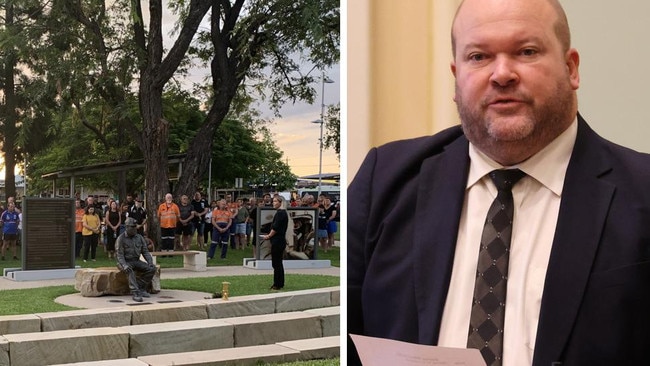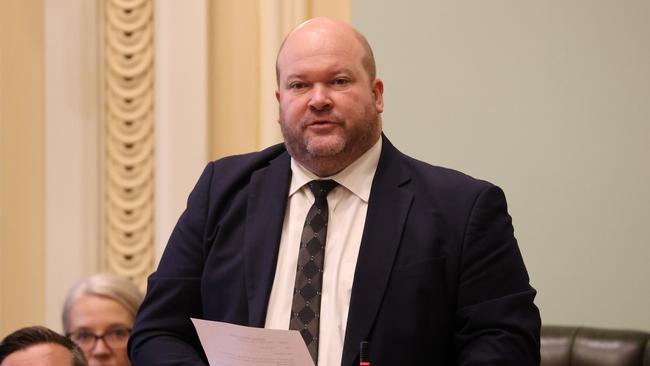Committee tables report into Qld coal mine safety
After a six-month investigation into safety practices, a parliamentary committee has recommended changes to end mining’s culture of fear amid accounts of workers raising safety issues being sacked.

Business
Don't miss out on the headlines from Business. Followed categories will be added to My News.
As a desperate search was underway to rescue two now-deceased zinc miners in North Queensland, a parliamentary inquiry into coal mine safety called out the culture of fear it says dominates the industry.
The Resources and Transport committee’s report, tabled in parliament after six months’ investigation into safety practices across Queensland coal mining, delivered 11 recommendations with a call for new legislation to tighten up controls in a sector marked by recurrent fatalities.
“We heard accounts of labour hire workers being dismissed from site immediately for flagging safety issues and temporary employees who raise safety concerns being characterised as otherwise unsuited to their role and terminated,” the committee said.
“This must stop.”
Since 2000, there have been 26 fatalities across the state’s coal mines, four of them between 2020 and 2022.
Committee chair and Kurwongbah MP Shane King said failure in “tripartite” communication between workers, employers and government and regulatory agencies was a common theme in the committee’s six-month investigation, which saw it interview witnesses in Brisbane and Moranbah and take in multiple submissions.
List: The tragic stories of Australia’s worst mining disasters
To improve the sector’s reporting culture, the committee supports legislation to crack down on any potential reprisal for workers speaking out on safety, something CFMEU Queensland district president Stephen Smyth has welcomed.

“It clearly accepts that repercussion for workers who raise safety concerns is rife in the industry and the report recommends passing new laws to stop it,” he said.
“The Palaszczuk government needs to start drafting these new laws today.
“We know coal workers fear being disciplined and sacked if they raise safety concerns, especially labour hire workers.
“These measures need to be implemented urgently.”
The report also calls for a range of other measures to push the sector to a zero harm ideal.
For one thing, it recommends the Coal Mining Safety and Health Advisory Committee conduct independent research into the relationship between production rates and safety risk management, claiming conflicting claims between management and workers means an independent, empirical assessment was required.
“The committee notes the disjunct between coal mine operators’ stated commitments to safety and worker submissions about their daily experiences of inadequate site safety risk management,” the report states.
“We also note the impossible task of evaluating conflicting anecdotal evidence about how coal mine operators reconcile the competing priorities of production and safety in the absence of empirical evidence.”
The committee also calls for a review of the regulatory health and safety fee paid out by coal producers, with a view to redirecting the money to Resources Safety and Health Queensland to improve its capacity to monitor and assess noncompliance in the sector.
The committee also wants RSHQ to up the proportion of its unannounced inspections from 10-20 per cent at present to 25 per cent of all inspections by 2023-24.
It also calls for more discussion on how bonus structures affect safety.
Mining firms increasingly attach payouts to safety metrics at the management and worker level.
Current coal miner Scott Leggett, speaking before the committee, cautioned this could distort reporting if workers hid an injury to collect a bonus.
The latest report follows the 65 recommendations delivered by the Queensland Coal Mining Board of Inquiry, launched after the 2020 Grosvenor explosion that left five workers severely burned.
The committee lauded the progress made by industry in implementing the BOI’s recommendations, stating it was “generally satisfied”, but noted the BOI inquiry centred around Anglo American’s underground operation.
“We believe it is appropriate for RSHQ to seek immediate responses from surface coal mine operators regarding their implementation of BOI recommendations relevant to surface operations,” the committee states, setting a date of June 30 for the reports.
The report’s release comes on the same day two zinc miners in Northwest Queensland were confirmed dead after falling into a cavernous hole 125m underground.
Dylan Langridge and Trevor Davis were trapped in their vehicle after it plummeted 25m down a hole at the Dugald River mine near Cloncurry.





